We asked several EMR and consulting executives the following question:
Now that the ONC has announced the initial grants for Regional Extension Centers, what will be the effect on EHR selection and implementation for both the industry and your company in particular?
Michael Nissenbaum, President & CEO, Aprima Medical Software, Inc.

RECs will be gatekeepers, potentially easing or impeding access for EHR vendors to thousands of physicians, community by community. RECs may reduce the complexity physicians would otherwise encounter in evaluating and implementing EHRs. If a REC simply becomes an extension of one or two EHR vendors, physicians could be denied visibility to appropriate technology. Better: RECs should issue an RFP and assess vendors’ strengths and weaknesses by specialty and practice size. Aprima’s ideal for RECs: 80% of our clients are 1-5 physician practices. 70% are in primary care, RECs’ primary target. RECs offering training must consider EHR vendors that will define a training methodology that fits their resources. That should include product training, certification, updates, and more to ensure the success of the RECs and practices. Through Aprima’s certification training and Learning Management System, the physicians will be prepared to meet the “meaningful use” requirements. Aprima’s EHR includes a library of chief complaints, not a collection of templates. This eliminates customization costs. Furthermore, physicians can chart multiple chief complaints in one entry, accelerating encounters. We’ll empower RECs with tablet PCs so physicians can see how a template-free EHR shortens learning curves. Aprima will be a player in the REC paradigm.
Victor Arnold, Managing Partner, AsquaredM

What I am seeing is that our business should grow a bit from this announcement. It will however, likely be a delayed impact (we are a consulting firm). What we are seeing are the EMR/EHR vendors getting stretched thin by the surge in installations along with the clients getting overwhelmed as they truly begin to understand what they have taken on in terms of process change (clinical as well as administrative) and cast about for assistance to either keep their existing operations moving or to sit in the middle between the client IT staff, the vendor install team and the larger organization to help them really integrate the products in a “meaningful” (pun intended) way.
Brad Boyd, Vice President, Culbert Healthcare Solutions

Based on our discussions with RECs across the country, the EHR selection process has largely focused on two main criteria: functionality to support Meaningful Use and Total Cost of Ownership. EHR vendors with flexible licensing models will be able to compete for this business based on the total value of their offering as opposed to price alone. CHS is well positioned to assist these smaller practices with their EHR implementations because of our combination of practice operations and clinical transformation experience, as well as our EHR implementation methodology geared towards maintaining physician productivity throughout the EHR go-live process. While the potential revenue per physician for implementation services will impact margins, we believe it is imperative to resist the temptation to apply inexperienced yet lower cost resources to these engagements, which is a common approach undertaken by many staff augmentation firms.
Girish Kumar Navani, CEO, eClinicalWorks

RECs are responsible for helping primary care providers in small practices with the adoption of EMRs and to help providers get to “meaningful use”. We have a proven track record of implementations in this market segment. We should do well to meet their needs and we are confident that eClinicalWorks has the experience to partner with the RECs to implement the providers required in the timeframe to meet the project milestones. In addition, we are offering free Webinars, onsite assessment workshops and work-force development programs to train both the practices and the REC personnel to better support the deployment and usage of EMRs. As an example we have demonstrated that working with the NYC DOH on the PCIP project we have implemented 2000+ primary care providers in 2 years. Along with the deployment of the EMRs we have partnered with the PCIP (now a REC) to roll-out Clinical Decision Support for preventive and chronic care management and Quality Measure reporting for national quality measures. To be successful, vendors need to be able to implement the EMR and PM on a short timeline, and provide the necessary staffing of project managers, trainers and support personnel along with a comprehensive solution including clinical decision support and measure reporting. eClinicalWorks solutions should meet this criteria both as a company and as a product.
Eric Fishman, MD, Managing Member, EHR Scope, LLC

A saying that was commonly heard in my prior occupation is that ‘if you ask 2 Orthopedic Surgeons how to operate on any individual condition, you’ll get three answers.’ The corollary, I believe, is that if you ask 32 RECs how they will address their grant obligations to assist physicians with their selection and implementation of EHR technology, I believe you’ll receive 33 answers. Obviously, some of the RECs have already ‘chosen’ their preferred vendors, as they have pre-existing business relationships with one or more ambulatory EHR vendors. Others are more open minded. Some appear to be moving at warp speed, with extraordinarily rapid RFI timeframes, and others seem to be putting off every decision until they have received reams of information from all potential participants. EHR Scope, LLC has been providing a meaningful (no pun intended) number of services similar to those that the RECs are asked to perform. For instance, we have 50,000 data points in our database of EHR vendors, and we have already had substantive discussions with a variety of RECs in which they appear to be interested in utilizing and possibly ‘white labeling’ our matching system for their priority primary care providers. This could be done either through www.EMRConsultant.com in which one of our staff (or their staff) analyzes a practice’s requirements, or through http://www.ehrscope.com/emr-comparison/ which provides real-time answers, 24/7. Possibly of most interest have been our educational videos, a few of which can be seen at http://www.ehrtv.com/category/reality-ehrtv/ and http://www.ehrtv.com/category/educational/ in which we document the process of readiness assessment, vendor selection and implementation. We are expecting a very busy 2010!
Tee Green, President, Greenway Medical Technologies
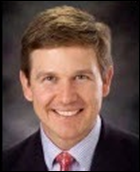
Our experience thus far has been that REC program managers are seeking much of the same reporting and interoperability capabilities that our practices and medical centers desire, with the extra assurance of the ability to exchange with other systems. The standardization that meaningful use is bringing has been welcome. I think for the industry it’s important to keep the focus on the greater healthcare benefits these networks bring, both to underserved populations and the spreading of best practices. It’s also very important for the industry to remember that RECs need to be sustained well past the initial funding years, and that we need to help achieve that. We at Greenway have taken heart in the actual language of the REC funding act, which states in part, “The ultimate measure of a regional center’s effectiveness will be whether it has assisted providers in becoming meaningful users of certified EHR technology.” That’s where the main goal comes full circle; if that is achieved, than Greenway and the industry has done our job.
Hayes Management Consulting, Peter J. Butler, President

The flurry of implementation activity will certainly kick up some dust among vendors, consultants, RECs and physicians. The question is, what will be there when the dust settles? Will it be well executed EHRs that are nicely connected to the practice management system, with staff well trained and physicians supported? Will the $5,000 have been enough? Hayes is often called in during the middle of an implementation that needs help due to unforeseen costs and resource needs. We work on improving communication to physicians, clarifying goals, and shoring up understaffed help desk teams that aren’t able to respond adequately to users. The RECs are not simply implementing EHRs. They will need to manage the physicians expectations, and build a communications and training infrastructure to ensure a successful phase 1 execution. The effect of RECs on the industry and on Hayes will depend on the RECs’ ability to be successful at this with the funds allotted.
Jay R. Anders, MD, CMIO, MED3OOO, Inc.

The regional centers set up by ONCHIT are to be advisory in nature. Since the certification of EHR technology, most physicians look for the certification first then look at functionality, ease of use, ease of implementation and cost. Once the meaningful use certification becomes final, this will also become a criteria. Physicians will look for advice from consultants and peer references. I don’t think the regional centers will play a great role in helping choose a particular solution. They may play a bigger role in the implementation, especially when it comes to changes in physician behavior that will have to be accomplished to reach meaningful use. Our company has been helping physicians look at their workflow and practice prior to choosing an EHR. This allows for an easier transition into the electronic world. I doubt the regional centers will impact the adoption of our solutions in medium to large practices but may play a role in the smaller groups and solo practitioners.
Scott Decker, President, NextGen Healthcare

It is somewhat hard to answer this question at such an early stage in the evolution of Regional Extension Centers (RECs). We expect about 70 RECs to be created across the country over the course of the coming year and that there may be quite a bit of variability in the model and services provided by each of the individual REC instances. With that said, based on the activity and interactions we have had to date, we do see some trends emerging. RECs are funded by ARRA as implementation and optimization organizations (IOOs) to directly help providers meet Meaningful Use requirements. In this role, they provide complementary and/or alternative services to the implementation programs we offer to new clients. We anticipate RECs will offer additional resources to the market to help ensure the availability of these resources to medical providers to help them achieve a level of EHR usage based on compliance with the 25 criteria for achieving Stage 1 Meaningful Use. We also see the potential for RECs to provide an independent service to our clients who have already completed their EHR implementation phase with NextGen Healthcare, but may now seek additional support on their path to Meaningful Use. Regarding EHR selection, we expect REC endorsement of a specific vendor to help providers increase their confidence that the products they select will meet their clinical needs and qualify for Meaningful Use. Additionally, they potentially provide a streamlined contracting process by pre-negotiating terms and conditions and/or pricing with selected vendors. We do expect that a REC endorsement of an EHR will have the “halo effect” of externally validating the credibility and usability of a product or solution, thereby directly and indirectly affecting purchasing selections. Accordingly, we expect RECs to become an important channel in the market and we are investing significant resources to work with the named and emerging RECs to attempt to create win/win business models for all concerned parties. We look forward to integrating our efforts and significant market experience with the RECs to ensure all current and future NextGen Healthcare clients will achieve Meaningful Use when they are ready.
Andy Riedel, Manager of EHR Marketing, Sage
For those physicians who are actively considering EHR, the RECs may help to narrow the selection, but we anticipate physician buying decisions will continue to be influenced mainly by other physicians. However, in the area of implementation, the RECs are in a position to fill a much-needed gap, especially around EHR readiness and change management. Sage customers have had some positive experiences with the QIO/DOQ-IT organizations in this respect, and while the RECs share a similar charter, the potential is far greater this time around, based both on the level of funding awarded and having ARRA/HITECH concurrently driving interest in EHR adoption. Sage has an installed base of thousands of physicians who are looking to adopt EHR and can benefit from the kinds of services the RECs plan to offer. We expect to partner successfully with RECs in creating a positive experience for physician practices.
Evan Steele, CEO, SRSoft

Implementation and training is critical to successful EMR adoption. Implementation efforts have had their share of failures, even when they have been conducted by the vendors’ experienced, homegrown, and home-trained experts. When it comes to REC-trained implementation personnel, I have several concerns about what they will be able to add to a process already fraught with challenges. With only six months of training, these implementers cannot possibly be anywhere near as skilled as the EMR vendors’ own team members, who have been working with the companies for years. On which software will these REC implementers be trained to implement? We all know that when you’ve seen one EMR, you’ve seen one EMR! Furthermore, small practices—which lack savvy project managers, lack their own IT experts, and cannot afford to hire outside template designers—are the ones most in need of skilled and experienced assistance to get them across the finish line successfully. Unfortunately, I fear that these practices will also be ones most likely to get relatively untested REC trainers, and I remain skeptical that these implementers, trained for only a short period of time to meet the expected demand for rushed implementations, will be up to the task. The risk is that there will be an increase in what the AMA and 95 other physician societies estimate is an already abysmal 50% to 80% failure rate.



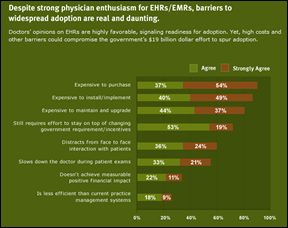

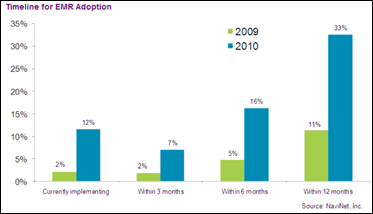

















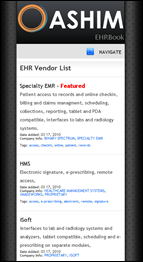
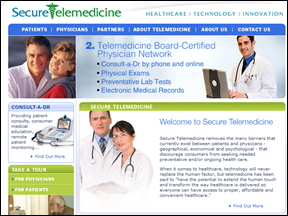
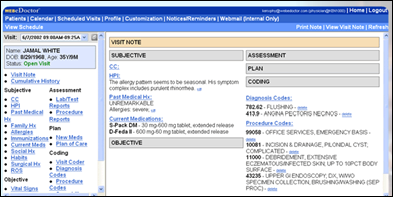
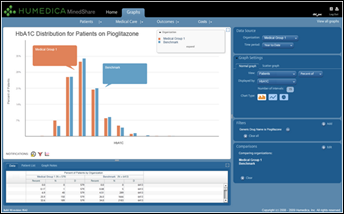

The article about Pediatric Associates in CA has a nugget with a potentially outsized impact: the implication that VFC vaccines…